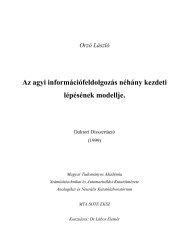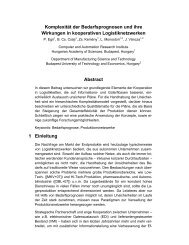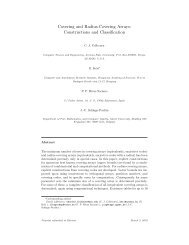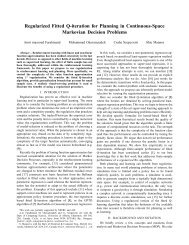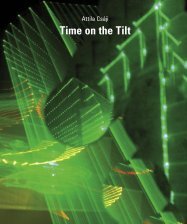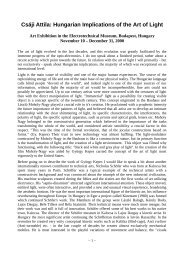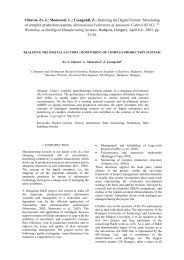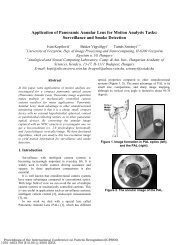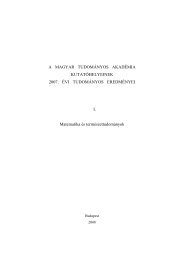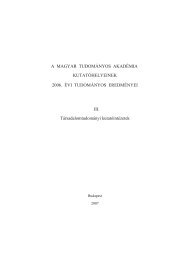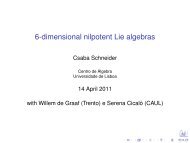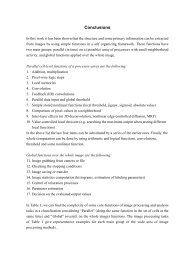- Page 1: Erzsébet Csuhaj-Varjú Marian Gheo
- Page 4 and 5: Editors Erzsébet Csuhaj-Varjú Dep
- Page 6 and 7: Preface In addition to the texts or
- Page 8 and 9: Contents M.A. Martínez-del-Amor, I
- Page 12 and 13: R. Freund configuration vanishes un
- Page 14 and 15: R. Freund by co-F IN. Two languages
- Page 16 and 17: R. Freund is applicable to a config
- Page 18 and 19: R. Freund Example 1. Consider the P
- Page 20 and 21: R. Freund by a rule. A decay of one
- Page 22 and 23: R. Freund maxobj used in Π [d] . A
- Page 24 and 25: R. Freund with R = {(I : (A, 1) →
- Page 26 and 27: R. Freund 3.3 Models for the 1-Rest
- Page 28 and 29: R. Freund rule is of the form (I :
- Page 30 and 31: R. Freund Yet in contrast to the re
- Page 32 and 33: R. Freund Proof (sketch). We only s
- Page 34 and 35: R. Freund Acknowledgements The auth
- Page 37 and 38: 13th Inter
- Page 39 and 40: Turing and von Neumanns brains and
- Page 41 and 42: Turing and von Neumanns brains and
- Page 43 and 44: Turing and von Neumanns brains and
- Page 45 and 46: Turing and von Neumanns brains and
- Page 47: Turing and von Neumanns brains and
- Page 50 and 51: J. Kelemen computable in certain co
- Page 52 and 53: J. Kelemen mutually interconnected
- Page 54 and 55: J. Kelemen certain sense the same p
- Page 56 and 57: V. Manca expression levels, etc.) d
- Page 59 and 60: 13th Inter
- Page 61 and 62:
Turing computability and membrane c
- Page 63 and 64:
13th Inter
- Page 65:
Membrane systems and hypercomputati
- Page 69 and 70:
13th Inter
- Page 71 and 72:
A case-study on the influence of no
- Page 73 and 74:
A case-study on the influence of no
- Page 75 and 76:
A case-study on the influence of no
- Page 77 and 78:
A case-study on the influence of no
- Page 79 and 80:
A case-study on the influence of no
- Page 81 and 82:
A case-study on the influence of no
- Page 83 and 84:
A case-study on the influence of no
- Page 85:
A case-study on the influence of no
- Page 88 and 89:
A. Alhazov, R. Freund 2 Definitions
- Page 90 and 91:
A. Alhazov, R. Freund r| ¬{q1,··
- Page 92 and 93:
A. Alhazov, R. Freund - l h : HALT
- Page 94 and 95:
A. Alhazov, R. Freund Remark 5. As
- Page 96 and 97:
A. Alhazov, R. Freund In Examples 1
- Page 99 and 100:
13th Inter
- Page 101 and 102:
Time-varying sequential P systems t
- Page 103 and 104:
Time-varying sequential P systems w
- Page 105 and 106:
Time-varying sequential P systems I
- Page 107 and 108:
Time-varying sequential P systems T
- Page 109 and 110:
Time-varying sequential P systems L
- Page 111 and 112:
Time-varying sequential P systems s
- Page 113 and 114:
Time-varying sequential P systems C
- Page 115 and 116:
13th Inter
- Page 117 and 118:
One-membrane symport P systems with
- Page 119 and 120:
One-membrane symport P systems with
- Page 121 and 122:
One-membrane symport P systems with
- Page 123 and 124:
One-membrane symport P systems with
- Page 125 and 126:
13th Inter
- Page 127 and 128:
Mobile membranes with objects on su
- Page 129 and 130:
Mobile membranes with objects on su
- Page 131 and 132:
Mobile membranes with objects on su
- Page 133 and 134:
Mobile membranes with objects on su
- Page 135 and 136:
Mobile membranes with objects on su
- Page 137 and 138:
Mobile membranes with objects on su
- Page 139 and 140:
Mobile membranes with objects on su
- Page 141:
Mobile membranes with objects on su
- Page 144 and 145:
F.G.C. Cabarle, H.N. Adorna graphs
- Page 146 and 147:
F.G.C. Cabarle, H.N. Adorna weight
- Page 148 and 149:
F.G.C. Cabarle, H.N. Adorna OR-spli
- Page 150 and 151:
F.G.C. Cabarle, H.N. Adorna a spike
- Page 152 and 153:
F.G.C. Cabarle, H.N. Adorna Fig. 6.
- Page 154 and 155:
F.G.C. Cabarle, H.N. Adorna Fig. 8.
- Page 156 and 157:
F.G.C. Cabarle, H.N. Adorna Fig. 10
- Page 158 and 159:
F.G.C. Cabarle, H.N. Adorna Referen
- Page 161 and 162:
13th Inter
- Page 163 and 164:
2D P colonies The first rule type,
- Page 165 and 166:
2D P colonies - f ∈ A is the fina
- Page 167 and 168:
2D P colonies 5. when there are thr
- Page 169 and 170:
2D P colonies Fig. 3. The configura
- Page 171 and 172:
13th Inter
- Page 173 and 174:
Fast distributed DFS solutions for
- Page 175 and 176:
Fast distributed DFS solutions for
- Page 177 and 178:
Fast distributed DFS solutions for
- Page 179 and 180:
Fast distributed DFS solutions for
- Page 181 and 182:
Fast distributed DFS solutions for
- Page 183 and 184:
Fast distributed DFS solutions for
- Page 185 and 186:
Fast distributed DFS solutions for
- Page 187 and 188:
Fast distributed DFS solutions for
- Page 189 and 190:
Fast distributed DFS solutions for
- Page 191 and 192:
Fast distributed DFS solutions for
- Page 193 and 194:
Fast distributed DFS solutions for
- Page 195 and 196:
Fast distributed DFS solutions for
- Page 197:
Fast distributed DFS solutions for
- Page 200 and 201:
R. Freund, I. Pérez-Hurtado, A. Ri
- Page 202 and 203:
R. Freund, I. Pérez-Hurtado, A. Ri
- Page 204 and 205:
R. Freund, I. Pérez-Hurtado, A. Ri
- Page 206 and 207:
R. Freund, I. Pérez-Hurtado, A. Ri
- Page 208 and 209:
R. Freund, I. Pérez-Hurtado, A. Ri
- Page 210 and 211:
R. Freund, I. Pérez-Hurtado, A. Ri
- Page 212 and 213:
Zs. Gazdag, G. Kolonits formula and
- Page 214 and 215:
Zs. Gazdag, G. Kolonits Now assume
- Page 216 and 217:
Zs. Gazdag, G. Kolonits membrane sy
- Page 218 and 219:
Zs. Gazdag, G. Kolonits • In the
- Page 220 and 221:
Zs. Gazdag, G. Kolonits References
- Page 222 and 223:
T. Hinze, B. Schell, M. Schumann, C
- Page 224 and 225:
T. Hinze, B. Schell, M. Schumann, C
- Page 226 and 227:
T. Hinze, B. Schell, M. Schumann, C
- Page 228 and 229:
T. Hinze, B. Schell, M. Schumann, C
- Page 230 and 231:
T. Hinze, B. Schell, M. Schumann, C
- Page 232 and 233:
T. Hinze, B. Schell, M. Schumann, C
- Page 234 and 235:
T. Hinze, B. Schell, M. Schumann, C
- Page 236 and 237:
T. Hinze, B. Schell, M. Schumann, C
- Page 238 and 239:
T. Hinze, B. Schell, M. Schumann, C
- Page 240 and 241:
T. Hinze, B. Schell, M. Schumann, C
- Page 242 and 243:
T. Hinze, B. Schell, M. Schumann, C
- Page 244 and 245:
F. Ipate, C. Dragomir, R. Lefticaru
- Page 246 and 247:
F. Ipate, C. Dragomir, R. Lefticaru
- Page 248 and 249:
F. Ipate, C. Dragomir, R. Lefticaru
- Page 250 and 251:
F. Ipate, C. Dragomir, R. Lefticaru
- Page 252 and 253:
F. Ipate, C. Dragomir, R. Lefticaru
- Page 254 and 255:
F. Ipate, C. Dragomir, R. Lefticaru
- Page 256 and 257:
F. Ipate, C. Dragomir, R. Lefticaru
- Page 258 and 259:
F. Ipate, C. Dragomir, R. Lefticaru
- Page 260 and 261:
L.F. Macías-Ramos, M.J. Pérez-Jim
- Page 262 and 263:
L.F. Macías-Ramos, M.J. Pérez-Jim
- Page 264 and 265:
L.F. Macías-Ramos, M.J. Pérez-Jim
- Page 266 and 267:
L.F. Macías-Ramos, M.J. Pérez-Jim
- Page 268 and 269:
L.F. Macías-Ramos, M.J. Pérez-Jim
- Page 270 and 271:
L.F. Macías-Ramos, M.J. Pérez-Jim
- Page 272 and 273:
L.F. Macías-Ramos, M.J. Pérez-Jim
- Page 274 and 275:
L.F. Macías-Ramos, M.J. Pérez-Jim
- Page 277 and 278:
13th Inter
- Page 279 and 280:
The efficiency of tissue P systems
- Page 281 and 282:
The efficiency of tissue P systems
- Page 283 and 284:
The efficiency of tissue P systems
- Page 285 and 286:
The efficiency of tissue P systems
- Page 287 and 288:
The efficiency of tissue P systems
- Page 289 and 290:
The efficiency of tissue P systems
- Page 291 and 292:
13th Inter
- Page 293 and 294:
DCBA: Simulating population dynamic
- Page 295 and 296:
DCBA: Simulating population dynamic
- Page 297 and 298:
DCBA: Simulating population dynamic
- Page 299 and 300:
DCBA: Simulating population dynamic
- Page 301 and 302:
DCBA: Simulating population dynamic
- Page 303 and 304:
DCBA: Simulating population dynamic
- Page 305 and 306:
DCBA: Simulating population dynamic
- Page 307 and 308:
DCBA: Simulating population dynamic
- Page 309:
DCBA: Simulating population dynamic
- Page 312 and 313:
T. Mihálydeák, Z. Csajbók are ab
- Page 314 and 315:
T. Mihálydeák, Z. Csajbók The se
- Page 316 and 317:
T. Mihálydeák, Z. Csajbók - an m
- Page 318 and 319:
T. Mihálydeák, Z. Csajbók Propos
- Page 320 and 321:
T. Mihálydeák, Z. Csajbók 3 P Sy
- Page 322 and 323:
T. Mihálydeák, Z. Csajbók 4 Futu
- Page 324 and 325:
B. Nagy One of the aim of many peop
- Page 326 and 327:
B. Nagy 3. If this clause contain a
- Page 328 and 329:
B. Nagy k-level binary tree. Each p
- Page 330 and 331:
B. Nagy 2.8 Neural-like Membrane Sy
- Page 332 and 333:
B. Nagy Proposition 1. Every CNF fo
- Page 334 and 335:
B. Nagy Due to the deterministic fi
- Page 336 and 337:
B. Nagy the SAT and n-SAT languages
- Page 338 and 339:
B. Nagy 11. M. Hirversalo, Quantum
- Page 341 and 342:
13th Inter
- Page 343 and 344:
Multigraphical membrane systems rev
- Page 345 and 346:
Multigraphical membrane systems rev
- Page 347 and 348:
Multigraphical membrane systems rev
- Page 349:
Multigraphical membrane systems rev
- Page 352 and 353:
R. Pagliarini, O. Agrigoroaiei, G.
- Page 354 and 355:
R. Pagliarini, O. Agrigoroaiei, G.
- Page 356 and 357:
R. Pagliarini, O. Agrigoroaiei, G.
- Page 358 and 359:
R. Pagliarini, O. Agrigoroaiei, G.
- Page 360 and 361:
R. Pagliarini, O. Agrigoroaiei, G.
- Page 362 and 363:
R. Pagliarini, O. Agrigoroaiei, G.
- Page 364 and 365:
R. Pagliarini, O. Agrigoroaiei, G.
- Page 366 and 367:
R. Pagliarini, O. Agrigoroaiei, G.
- Page 368 and 369:
R. Pagliarini, O. Agrigoroaiei, G.
- Page 370 and 371:
A.E. Porreca, A. Leporati, G. Mauri
- Page 372 and 373:
A.E. Porreca, A. Leporati, G. Mauri
- Page 374 and 375:
A.E. Porreca, A. Leporati, G. Mauri
- Page 376 and 377:
A.E. Porreca, A. Leporati, G. Mauri
- Page 378 and 379:
A.E. Porreca, A. Leporati, G. Mauri
- Page 380 and 381:
A.E. Porreca, A. Leporati, G. Mauri
- Page 382 and 383:
A.E. Porreca, A. Leporati, G. Mauri
- Page 384 and 385:
A.E. Porreca, A. Leporati, G. Mauri
- Page 386 and 387:
P. Ramón, A. Troina unique output
- Page 388 and 389:
P. Ramón, A. Troina substitution o
- Page 390 and 391:
P. Ramón, A. Troina CWC Modelling
- Page 392 and 393:
P. Ramón, A. Troina Fig. 1. Metapo
- Page 394 and 395:
P. Ramón, A. Troina Fig. 2. r/K se
- Page 396 and 397:
P. Ramón, A. Troina Fig. 3. Compet
- Page 398 and 399:
P. Ramón, A. Troina Fig. 4. A Thro
- Page 400 and 401:
P. Ramón, A. Troina from were the
- Page 402 and 403:
P. Ramón, A. Troina hand, the Calc
- Page 404 and 405:
P. Ramón, A. Troina 20. Cardona, M
- Page 407 and 408:
13th Inter
- Page 409 and 410:
Observer/interpreter P systems •
- Page 411 and 412:
Observer/interpreter P systems 3 Ob
- Page 413 and 414:
Observer/interpreter P systems {a
- Page 415 and 416:
Observer/interpreter P systems Proo
- Page 417 and 418:
Observer/interpreter P systems ther
- Page 419 and 420:
13th Inter
- Page 421 and 422:
Limits of the power of tissue P sys
- Page 423 and 424:
Limits of the power of tissue P sys
- Page 425 and 426:
Limits of the power of tissue P sys
- Page 427 and 428:
Limits of the power of tissue P sys
- Page 429 and 430:
Limits of the power of tissue P sys
- Page 431 and 432:
Limits of the power of tissue P sys
- Page 433 and 434:
13th Inter
- Page 435 and 436:
Fast hardware implementations of P
- Page 437 and 438:
Fast hardware implementations of P
- Page 439 and 440:
Fast hardware implementations of P
- Page 441 and 442:
Fast hardware implementations of P
- Page 443 and 444:
Fast hardware implementations of P
- Page 445 and 446:
RIGHT PROPAGATION LEFT PROPAGATION
- Page 447 and 448:
Fast hardware implementations of P
- Page 449 and 450:
Fast hardware implementations of P
- Page 451 and 452:
Fast hardware implementations of P
- Page 453:
Extended Abstracts
- Page 456 and 457:
A. Ţurcanu, F. Ipate 2 Simplifying
- Page 458:
A. Ţurcanu, F. Ipate act1 : cell :



